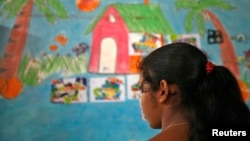Police in the Indian state of West Bengal are going beyond the call of duty by raising funds for the women they rescue from sex traffickers to help them get back on track.
“The girls are hardly literate, have no access to bank loans, and government schemes are not enough to sustain them in the long run,” said police officer Chandra Sekhar Bardhan, who is spearheading the program in eastern India. “We had to do something, even though it did not fall in the realm of our duties.”
The scheme, the first of its kind, began this month, with 22 rescued women singled out for rehabilitation. Police then hope to reach out to 100 more women and create a model to replicate across the region.
Police tailor the aid to the individual women, asking firms to fund their needs as an act of corporate social responsibility. One of the women in the first group wants to set up a sewing business, another to drive her own taxi — anything rather than return to a life of poverty and unemployment.
Green pasture for traffickers
Of an estimated 20 million commercial sex workers in India, campaigners estimate that 16 million women and girls are the victims of sex trafficking. They are mostly trafficked for sexual exploitation, forced labor and child marriage.
The South 24 Parganas district where the project began has seen a steady rise in crime against women, with police recording a jump of more than 80 percent in the number of abductions between 2010 and 2013.
“Due to poverty and backwardness, the area has always been a green pasture for traffickers,” said Subhasree Raptan, coordinator of nonprofit Gorabbose Gram Bikas Kendra, which helps trafficked victims and is supporting the pilot project.
Raptan said the problem grew far worse after cyclone Aila in 2009, displacing more than a million people in the region.
No job, no chance
When victims are rescued from traffickers, they usually return to poverty, a dysfunctional family life and no job.
Work is key to a new life, and the first group of women include aspiring seamstresses, two women who want to run a stationary shop and another who wants to drive her own taxi.
“I did not know anything about the extent of human trafficking until I was posted to this region and came across the case of a 14-year-old victim, who had been trafficked, abused and dumped in a hospital,” said Bardhan, the policeman leading the project. “Now the program will run as long as the problem persists.”





